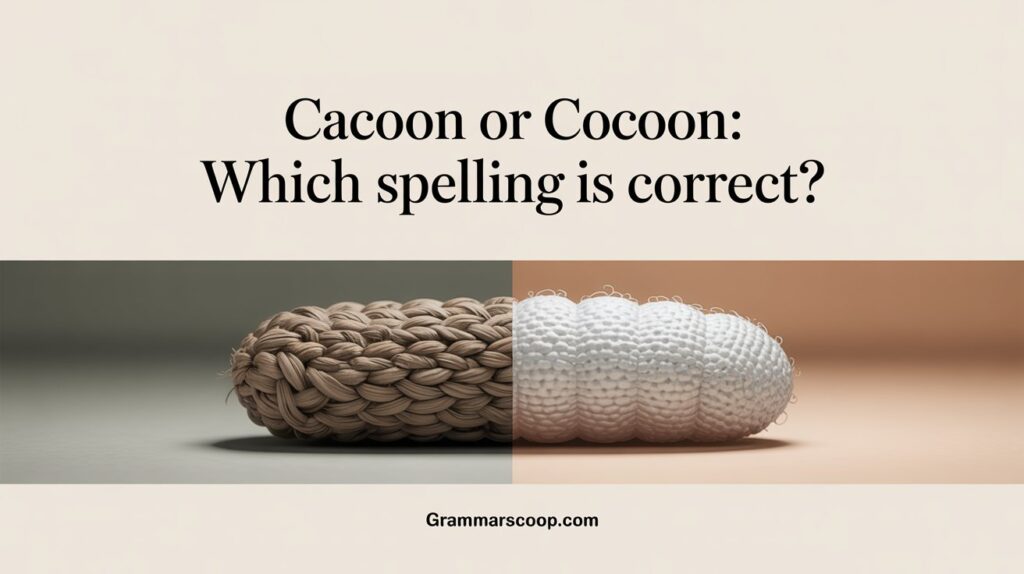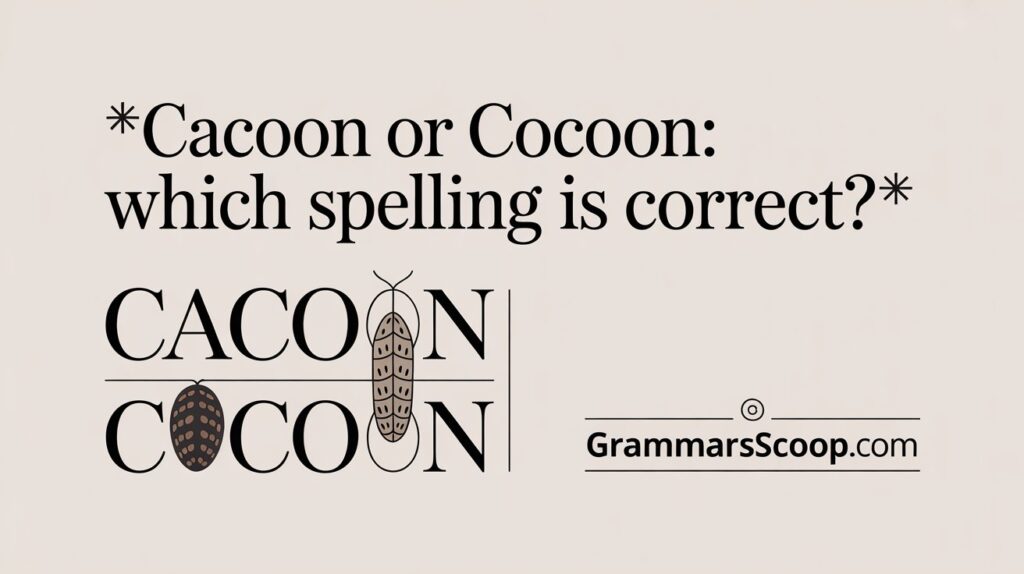Mistakes happen. But when it comes to spelling, some errors are more common—and more confusing—than others. One classic example? Cacoon or cocoon. Both versions pop up online, in messages, and even on product labels. So which one is actually correct? And why do people keep mixing them up?
Let’s unravel the facts. This post will answer all your questions about how to spell cocoon, what “cacoon” means (if anything), and how to avoid making this common mistake.
Quick Summary
“Cocoon” is the correct spelling in standard English.
“Cacoon” is a frequent misspelling. While it occasionally appears as a brand name or in casual writing, it’s not recognized by any major dictionary.
If you’re asking “how do you spell cocoon?”, the answer is: C-O-C-O-O-N.
Why Do People Confuse “Cacoon” and “Cocoon”?

Spelling confusion happens for a few common reasons, especially when words are primarily learned through speech rather than reading. Here’s why this mix-up is so persistent:
Phonetic Confusion
The word “cocoon” is pronounced /kəˈkuːn/. This makes it sound like it starts with a hard “k” sound and ends with a long “oo” sound, which can mislead people to spell it phonetically as cacoon.
Typos and Auto-Correct
Typing quickly on a smartphone or keyboard can easily turn “cocoon” into “cacoon.” And while some apps catch the error, others let it slip by.
Lack of Exposure
If you’ve never seen the word written down—especially in books or academic writing—you’re more likely to guess the spelling based on how it sounds.
Is “Cacoon” a Real Word?
Here’s the direct answer: No, “cacoon” is not a recognized word in English.
- It’s not in any major dictionary, including Oxford, Cambridge, or Merriam-Webster.
- Grammar and spell-check tools like Grammarly and Microsoft Word flag “cacoon” as incorrect.
- Usage in published writing is rare, and usually only appears in misspelled blogs or social media posts.
Brand Exception: Cacoon World
Some companies have used “Cacoon” intentionally as a brand name. For example, Cacoon World produces hanging tent hammocks. In these cases, the word is trademarked—but it doesn’t make it correct for general English use.
What Does “Cocoon” Mean?
The word “cocoon” refers to the protective covering spun by insects like silkworms and butterflies before they emerge in their adult form.
Standard Dictionary Definition
Cocoon (noun): a case of silky thread spun by the larvae of various insects, serving as a protective covering while they develop.
But it goes beyond bugs. “Cocoon” is also used in figurative language to describe comfort, isolation, and transformation.
Figurative Uses
- Emotional retreat: “After the breakup, she cocooned herself in her apartment.”
- Transformation: “College was a cocoon for his growth and self-discovery.”
- Marketing: “Our blanket wraps you in a warm cocoon of comfort.”
Quick Table: Literal vs Figurative Uses
| Use Case | Meaning | Example |
|---|---|---|
| Literal | Insect protective shell | “The caterpillar spun a cocoon.” |
| Emotional | Withdraw into a safe space | “He cocooned himself after the trauma.” |
| Lifestyle | Cozy, secure environment | “She cocooned on the couch with tea.” |
| Symbolic | Change, rebirth, or protection | “The company emerged from its cocoon.” |
Cacoon vs Cocoon: Key Differences

Let’s compare them side by side.
Spelling
| Word | Correct? | Dictionary Entry | Notes |
|---|---|---|---|
| Cocoon | Yes | Yes | Accepted worldwide |
| Cacoon | No | No | Only used as a brand or by mistake |
Meaning
- Cocoon = legitimate word with literal and metaphorical meanings.
- Cacoon = meaningless outside of branding.
Usage
| Use | Cocoon | Cacoon |
|---|---|---|
| Academic | Frequently used | Incorrect |
| Digital | Blogs, articles | Typos, forum posts |
| Branding | Occasionally branded | Some branded companies |
Real-World Examples
Incorrect: “Cacoon” in Use
- “The caterpillar is hiding in its cacoon.”
- “Cacooning yourself in a blanket is therapeutic.”
These are common examples of misspellings found in tweets and blog comments.
Correct: “Cocoon” in Use
- “After spinning a cocoon, the larva begins metamorphosis.”
- “She cocooned herself from toxic friends.”
Each of these examples shows proper spelling in both scientific and casual contexts.
Word Origins and Etymology

Origin of “Cocoon”
- Derived from French “cocon”, meaning egg casing.
- Comes from Latin “coccum”, meaning berry or shell.
- First recorded use in English in the 17th century, primarily in scientific texts about silkworms.
It has since expanded into everyday language and symbolic writing.
Origin of “Cacoon”
- No etymology.
- Not derived from Latin, Greek, French, or Germanic roots.
- Appears only as a modern phonetic error or a marketing invention.
Explore further:
- Preexisting or Pre-Existing: Which One is Correct?
- What is Plural of Fox and What is Plural of Ox?
- Skill Set Or Skillset And Skill-Set: Which Is Actually Correct?
- Compare and Contrast: Definitions, Differences, and Examples
- Afterward or Afterwards: Is There Any Difference?
Cacoon or Cocoon? Search Trends and Behavior
According to Google Trends and SEO tools, people search both spellings frequently—but only one is correct.
Search Data (2025)
| Keyword Phrase | Global Monthly Searches |
|---|---|
| spell cocoon | 2,100 |
| how do you spell cocoon | 1,700 |
| spell cacoon | 1,200 |
| cocoon or cacoon | 1,600 |
| cacoon or cocoon | 1,300 |
Google typically auto-corrects “cacoon” to “cocoon,” but this highlights just how common the confusion is.
Conclusion: The Final Answer
To put it plainly:
- Cocoon is the correct spelling.
- Cacoon is an error—unless it’s a brand name.
- Always double-check spelling, especially in professional or academic contexts.
If you’re wondering whether it’s cacoon or cocoon, remember: there’s only one spelling that wraps your message in clarity—C-O-C-O-O-N.
“The difference between the right word and the almost right word is the difference between lightning and a lightning bug.” — Mark Twain
FAQs
Q: How do you spell cocoon?
A: The correct spelling is C-O-C-O-O-N.
Q: Is “cacoon” a valid word?
A: No. It’s not found in any major English dictionary.
Q: Can “cacoon” be used at all?
A: Only in branded names like “Cacoon World.” Otherwise, it’s a mistake.
Q: Is “cocoon” used figuratively?
A: Yes. It often symbolizes protection, isolation, or transformation.

Lisa Morris is a seasoned blogger and language enthusiast with a passion for making grammar simple and engaging. At Grammar Scoop, she shares clear, concise tips that help readers master the rules of English with confidence.






